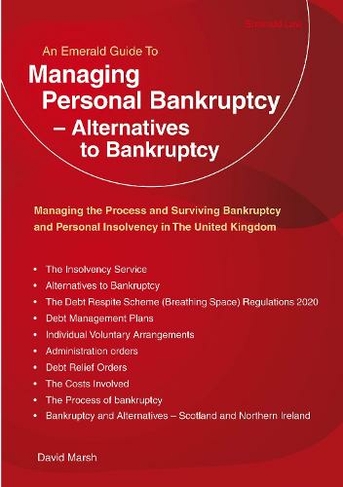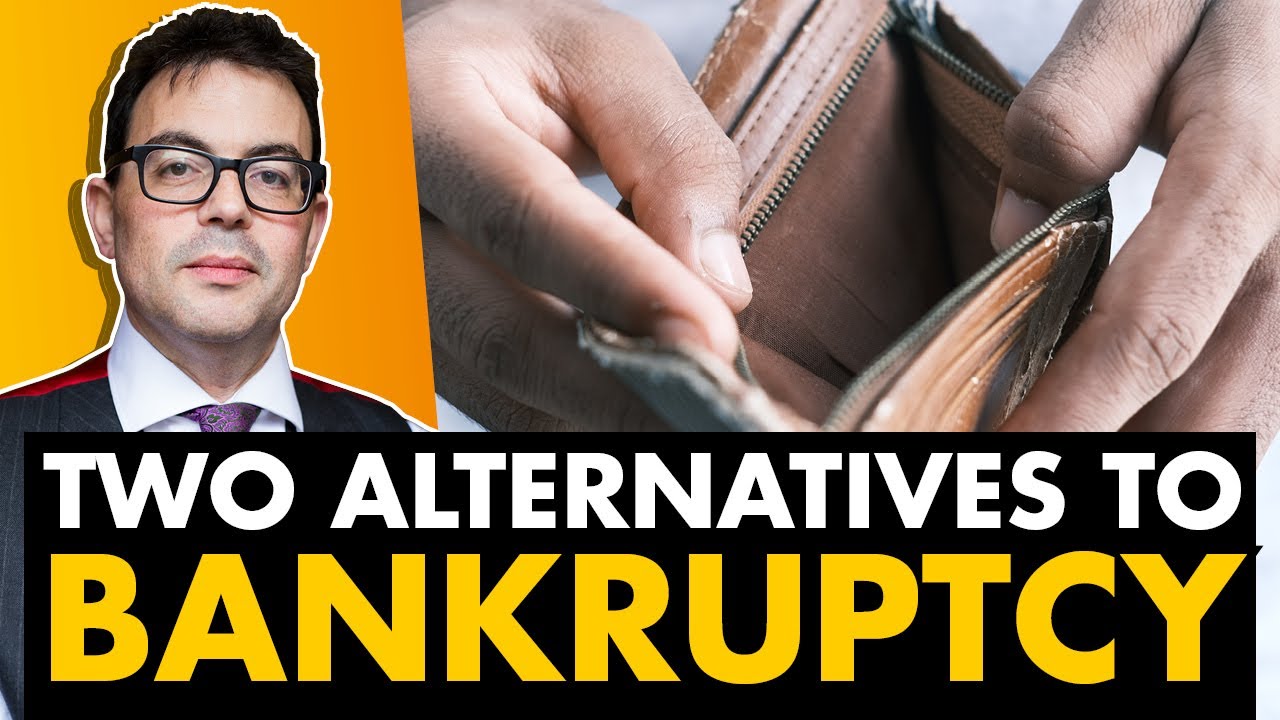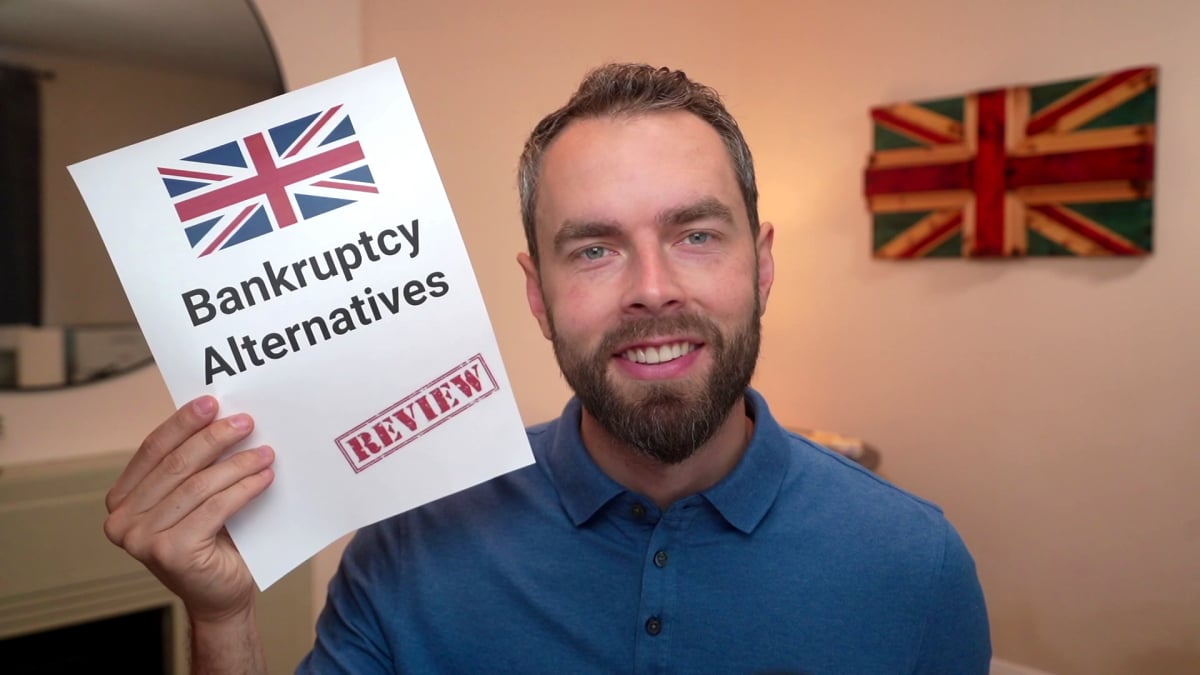If you find yourself drowning in debt and overwhelmed by the thought of bankruptcy, there may be a glimmer of hope. This article explores an alternative solution that could potentially save you from resorting to bankruptcy. Discover a viable option that allows you to Regain control of your finances and steer towards a brighter financial future.

Options to Consider Before Filing for Bankruptcy
When facing overwhelming debt, it’s crucial to explore all your options before resorting to bankruptcy. Bankruptcy should be a last resort, as it can have long-lasting effects on your financial future. Fortunately, there are alternative debt relief options available that can help you regain control of your finances. In this article, we’ll explore various alternatives to bankruptcy, providing a comprehensive guide to help you make an informed decision about the best course of action for your particular situation.
Credit Counseling
Credit counseling is an excellent starting point for individuals struggling with debt. It involves working with a certified credit counselor to develop a realistic budget and create an effective debt repayment plan. These counselors can negotiate with your creditors on your behalf, aiming for reduced interest rates, waived fees, or extended repayment terms. Credit counseling can provide valuable financial education and support, equipping you with the tools necessary to manage your debts responsibly.
Debt Consolidation
Consolidating your debts allows you to combine multiple high-interest debts into one manageable loan. By doing so, you can potentially secure a lower interest rate and simplify your repayment process. Debt consolidation can take different forms, such as obtaining a personal loan to pay off your debts or utilizing a balance transfer credit card. It’s essential to carefully evaluate the terms and fees associated with debt consolidation options before making a decision.
Debt Settlement
Debt settlement involves negotiating with your creditors to settle your debts for less than the total amount owed. It can be a viable option if you are unable to afford your current payments but have a lump sum available to offer as a settlement. debt settlement typically requires working with a reputable debt settlement company or hiring a debt settlement attorney. It’s vital to proceed with caution when considering debt settlement, as it can have negative consequences, such as a damaged credit score and potential tax implications.
Debt Management Plan
A debt management plan (DMP) is a structured repayment plan facilitated by a credit counseling agency. Through a DMP, you make one monthly payment to the agency, and they distribute the funds to your creditors on your behalf. The agency can also negotiate with your creditors to secure reduced interest rates or waived fees. A DMP can help you become debt-free within a set timeframe, typically three to five years. It’s crucial to find a reputable credit counseling agency that offers transparent terms and does not charge excessive fees.
Negotiating with Creditors
If you’re considering bankruptcy, open communication with your creditors is essential. In many cases, creditors may be willing to work with you to find a mutually beneficial solution before resorting to legal action. Negotiating with creditors involves initiating a conversation, explaining your financial situation, and proposing an alternative repayment plan. The key is to present a realistic plan that demonstrates your commitment to repaying your debts.
Exploring Debt Relief Programs
Debt Relief Grants
Debt relief grants are funds provided by private organizations, nonprofits, or even the government to help individuals struggling with debt. Unlike loans, grants do not need to be repaid, making them an attractive option for those in dire financial situations. However, debt relief grants may have specific eligibility criteria, and competition can be fierce. Researching and applying for debt relief grants can be time-consuming but can provide significant relief if approved.
Debt Relief Loans
Debt relief loans are personal loans specifically designed to help individuals consolidate and pay off their debts. These loans typically come with lower interest rates than credit cards or payday loans, making them a useful tool for debt restructuring. However, it’s important to carefully consider the repayment terms and fees associated with debt relief loans before committing to one. Ensure that the loan terms align with your financial capabilities and that the interest savings outweigh any potential fees.
Debt Relief Programs for Specific Industries
Certain industries, such as healthcare or education, offer debt relief programs tailored to individuals working in those fields. These programs may offer loan forgiveness, income-based repayment plans, or other forms of debt relief. If you work in a qualifying industry, exploring these specialized debt relief programs can provide significant relief and potentially help you avoid bankruptcy.
Debt Relief Programs for Veterans
For Veterans facing financial hardship, various debt relief programs and resources are specifically designed to provide assistance. Programs such as the Veterans’ Debt Management Initiative and VA Debt Management Center can help veterans negotiate with creditors or explore debt repayment options. As a veteran, it’s essential to explore these programs and take advantage of the support available to you.
Negotiating with Creditors
Creating a Repayment Plan
When negotiating with creditors, it’s essential to have a well-thought-out repayment plan in place. This plan should outline how much you can afford to pay each month and provide a realistic timeframe for debt repayment. By demonstrating your commitment to repaying your debts and offering a viable plan, you increase the likelihood of reaching a favorable agreement with your creditors.
Seeking a Temporary Forbearance
If you’re experiencing a temporary financial setback, such as a medical emergency or job loss, you may be able to request a temporary forbearance from your creditors. A forbearance allows you to temporarily pause or reduce your monthly payments until you’re able to resume regular payments. Communication is key when seeking forbearance, as explaining your situation and demonstrating your willingness to meet your obligations can increase the chances of your creditors granting a forbearance.
Requesting a Credit Card Rate Reduction
If credit card debts are a significant concern, reaching out to your credit card companies to Request a lower interest rate can be a viable option. Many credit card companies are willing to negotiate lower rates to retain your business and avoid the risk of default. By explaining your financial situation, expressing your commitment to repaying your debts, and presenting supporting evidence, you may be able to secure a reduced interest rate that helps you pay off your debts more quickly.
Working with Creditors and Collection Agencies
Payment Plans
When Working with creditors and collection agencies, payment plans offer a structured approach to debt repayment. These plans involve negotiating a specific monthly payment amount and establishing a timeline for debt settlement. Payment plans can help you stay organized, ensure regular repayment, and avoid escalating collection efforts. It’s important to negotiate favorable payment terms that align with your financial situation and to carefully review any agreements before signing.
Debt Settlement Negotiations
If your debts have been transferred to collection agencies, negotiating a debt settlement can provide an opportunity to pay off your debts for less than the total amount owed. Collection agencies often purchase debts for a fraction of their value and have more flexibility in negotiating settlements. However, it’s crucial to approach debt settlement negotiations cautiously and consider the potential consequences, such as the impact on your credit score and potential tax implications. Seeking professional guidance from a debt settlement attorney or a reputable debt settlement company can help you navigate this process.
Debt Validation
Debt validation is a process that involves requesting proof of the legality and accuracy of a debt from the collection agency. Under the Fair Debt Collection Practices Act (FDCPA), you have the right to request validation within 30 days of receiving a collection notice. Debt validation can help identify any errors or discrepancies in the debt, potentially leading to the debt being discharged or significantly reduced. It’s important to follow the proper procedures and timelines when requesting debt validation and to ensure that you’re working with reputable collection agencies.
Cease and Desist Letters
If you’re being harassed by collection agencies, sending a cease and desist letter can help stop the unwanted communication. A cease and desist letter demands that the collection agency stops contacting you, providing you with some relief from their aggressive collection efforts. While this does not eliminate your debt, it can provide a temporary respite and give you the opportunity to explore other debt relief options. It’s crucial to keep a record of all communication and to send the cease and desist letter via certified mail with a return receipt to ensure proof of delivery.

Exploring Alternative Legal Options
Consumer Proposal
A consumer proposal is a legal process available in Canada that allows individuals to make a formal offer to their creditors to settle their debts. This option enables you to repay a portion of your debts over an extended period while providing protection against further creditor actions. Consumer proposals can be an effective way to avoid bankruptcy while achieving debt reduction and a manageable repayment plan. It’s crucial to work with a licensed insolvency trustee to create and submit a consumer proposal.
Debt Arrangement Scheme
The Debt Arrangement Scheme (DAS) is a government-funded debt management program available in Scotland. DAS enables individuals struggling with debt to repay their debts over a longer period without the threat of legal action from creditors. Under DAS, you make regular payments to a qualified money adviser, and they distribute the funds to your creditors on your behalf. DAS can provide much-needed breathing space and financial stability while allowing you to repay your debts in a manageable manner.
Individual Voluntary Arrangement
In the United Kingdom, an Individual Voluntary Arrangement (IVA) is a legally binding agreement between an individual and their creditors. IVAs enable you to make reduced monthly payments over a fixed period, typically five or six years, after which any remaining debts are written off. IVAs are a popular alternative to bankruptcy and can provide the opportunity for debt reduction and a fresh start. It’s crucial to work with an insolvency practitioner when considering an IVA and to understand the potential impacts on your credit score and financial future.
Debt Repayment Order
In Scotland, a Debt Repayment Order (DRO) is a legal debt solution available for individuals with low income, low assets, and minimal debt owed. A DRO freezes your debts and interest for a year, allowing you to make affordable monthly payments. At the end of the year, if your financial situation remains the same and you meet the eligibility criteria, the remaining debts are written off. A DRO can be a valuable tool for individuals with limited financial resources, enabling them to become debt-free in a reasonable timeframe.
Considering Non-Bankruptcy Legal Solutions
Mediation
Mediation involves working with a neutral third party to facilitate negotiations between you and your creditors. The mediator helps guide the conversation, allowing both parties to express their concerns and interests. Mediation can be a useful alternative to bankruptcy, as it provides an opportunity to find mutually agreeable solutions without the need for litigation. The goal of mediation is to reach a settlement that benefits all parties involved while avoiding the time, expense, and stress associated with bankruptcy proceedings.
Arbitration
Similar to mediation, arbitration involves a neutral party who helps facilitate a resolution between you and your creditors. However, in arbitration, the arbitrator has the power to make a binding decision that both parties must abide by. This alternative to bankruptcy allows for a faster resolution and eliminates the need for litigation. It’s important to carefully review any arbitration agreements and understand the potential consequences before proceeding with arbitration.
Debt Relief Orders
In England, Wales, and Northern Ireland, a Debt Relief Order (DRO) is a legal solution designed for individuals with low income, low assets, and relatively low debt. A DRO freezes your debts for a year, during which you are not required to make any payments. If your financial situation remains the same at the end of the year, your debts are typically written off. A DRO can provide much-needed relief for individuals struggling to make ends meet, offering a pathway to debt-free living.
Protected Trust Deeds
A Protected Trust Deed (PTD) is a formal agreement available in Scotland that enables individuals to repay their debts over a fixed period, typically four years. Upon entering a PTD, you make affordable monthly payments to a licensed insolvency practitioner, who distributes the funds to your creditors. Protected Trust Deeds can provide an alternative to bankruptcy while providing legal protections and the potential for debt reduction. It’s essential to work with a reputable insolvency practitioner and understand the implications of a PTD on your credit score and financial future.

Understanding the Impact of Bankruptcy Alternatives
Credit Score Implications
When considering alternatives to bankruptcy, it’s vital to understand the impact on your credit score. While bankruptcy can have a significant negative impact on your credit score for several years, some alternative options may have a lesser impact or offer the potential for credit score improvement over time. It’s important to discuss the potential credit score implications with a financial professional, as they can provide guidance and help you navigate the best course of action for your specific situation.
Effects on Future Borrowing
Bankruptcy and its alternatives can have varying effects on your ability to borrow in the future. While bankruptcy can make it challenging to obtain credit immediately, some alternative options may allow for more favorable borrowing terms down the line. It’s essential to consider your long-term financial goals and discuss the potential effects on future borrowing with a financial advisor or credit counselor. They can help you develop a strategy to rebuild your credit and restore your borrowing capabilities.
Long-Term Financial Planning
When exploring alternatives to bankruptcy, it’s crucial to take a long-term view of your financial situation. Consider not only your current debts but also your future financial goals and aspirations. Working with a financial advisor can help you create a comprehensive financial plan that takes into account your debts, income, expenses, and financial objectives. They can also provide insights into the potential long-term consequences of different debt relief options, helping you make an informed decision that aligns with your overall financial well-being.
Pros and Cons of Bankruptcy Alternatives
Advantages
Bankruptcy alternatives provide several advantages over filing for bankruptcy. These include the potential for debt reduction, the ability to avoid the stigma associated with bankruptcy, and the opportunity for credit score improvement over time. Bankruptcy alternatives also allow individuals to maintain more control over their financial situation and avoid the potential loss of assets. By considering alternatives to bankruptcy, you can explore options that best suit your specific circumstances while minimizing the negative impacts on your financial future.
Disadvantages
While bankruptcy alternatives offer various benefits, they also come with potential disadvantages. Some alternatives may have an impact on your credit score, and certain programs may require specific eligibility criteria. Debt relief programs and negotiations can also be time-consuming and complex. It’s important to carefully evaluate the potential drawbacks of each alternative and weigh them against the advantages before making a decision. Seeking professional guidance can help you navigate these potential pitfalls and find the best path forward.

Consulting with Financial Professionals
Bankruptcy Attorney
When considering alternatives to bankruptcy, consulting with a bankruptcy attorney can provide valuable insights into the legal aspects of debt relief options. A bankruptcy attorney can assess your financial situation, explain the legal implications of each alternative, and recommend the best course of action based on your specific circumstances. Their expertise can help you navigate the complex legal processes, ensure compliance with applicable laws, and protect your rights throughout the debt relief journey.
Financial Advisor
A financial advisor can play a crucial role in helping you evaluate the financial implications of bankruptcy alternatives. They can assess your overall financial situation, provide guidance on debt management strategies, and help you develop a comprehensive financial plan. A financial advisor can also assist in exploring alternative options, such as investment opportunities or income-generating strategies, to help you achieve long-term financial stability. Their expertise and objective advice can be invaluable as you navigate the complex world of debt relief.
Credit Counselor
Credit counselors are professionals trained to provide guidance and support to individuals facing financial difficulties. They can analyze your financial situation, provide education on budgeting and money management, and help you develop a personalized debt repayment plan. Credit counselors can also negotiate with your creditors on your behalf and provide ongoing support throughout your debt relief journey. By working with a credit counselor, you can gain valuable insights and tools to help you regain control of your finances and avoid bankruptcy.
Conclusion
When facing overwhelming debt, it’s important to explore all available options before resorting to bankruptcy. Alternative solutions such as credit counseling, debt consolidation, negotiation with creditors, and debt relief programs offer viable pathways to regain control of your finances. By carefully evaluating the advantages and disadvantages of each option and seeking guidance from financial professionals, you can make an informed decision that aligns with your specific circumstances and long-term financial goals. Remember, there is hope and assistance available to help you overcome your financial challenges and create a brighter financial future.

